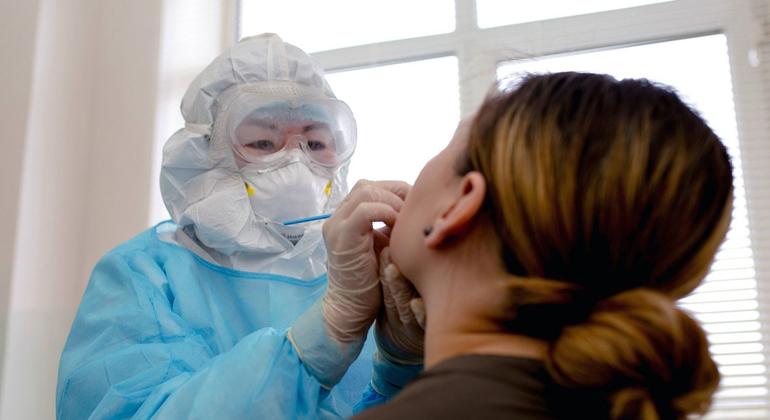‘Better safe than sorry’: UN health agency warns of widespread misuse of antibiotics during the COVID-19 era
 Antibiotics saw “extensive overuse” globally among hospitalized COVID-19 patients during the pandemic without improving clinical outcomes, while also potentially increasing the already serious and growing threat of antimicrobial resistance “from superbugs”, the UN World Health Organization (WHO) said on Friday.
Antibiotics saw “extensive overuse” globally among hospitalized COVID-19 patients during the pandemic without improving clinical outcomes, while also potentially increasing the already serious and growing threat of antimicrobial resistance “from superbugs”, the UN World Health Organization (WHO) said on Friday.
In an alert, WHO noted that although just eight per cent of hospitalized coronavirus patients also had bacterial infections which can be treated with antibiotics, a staggering three in four were given them on a “just in case” basis.
At no point during the global pandemic did the UN health agency recommend using antibiotics to treat the coronavirus COVID-19, insisted WHO spokesperson Dr Margaret Harris.
Viral, not bacterial
“The advice was very clear from the start, that this was a virus. So it wasn’t that there was any guidance or any recommendation that that clinicians go in this direction, but perhaps because people were dealing with something completely new, they were looking for whatever they thought might be appropriate.”
According to the UN health agency, antibiotic use ranged from 33 per cent for patients in the Western Pacific Region to 83 per cent in the Eastern Mediterranean and the African Regions. Between 2020 and 2022, prescriptions decreased over time in Europe and the Americas, but they increased in Africa.
Last hope
Data compiled by WHO also indicated that most antibiotics were given to critically ill COVID-19 patients at a global average of 81 per cent. Antibiotic use in mild or moderate infections showed considerable variation across regions, with highest use in Africa, at 79 per cent.
Worryingly, the UN agency found that the most frequently prescribed bacteria-busting antibiotics globally were those with higher potential for antimicrobial resistance (AMR) to antibiotics.
“When a patient requires antibiotics, the benefits often outweigh the risks associated with side effects or antibiotic resistance. However, when they are unnecessary, they offer no benefit while posing risks, and their use contributes to the emergence and spread of antimicrobial resistance,” said Dr Silvia Bertagnolio, WHO Unit Head for Surveillance, Evidence and Laboratory Strengthening, Division for AMR.
No positive impact
The UN health agency report maintained that antibiotic use “did not improve clinical outcomes for patients with COVID-19”.
Instead, their systematic prescription “might create harm for people without bacterial infection, compared to those not receiving antibiotics,” WHO said in a statement.
“These data call for improvements in the rational use of antibiotics to minimize unnecessary negative consequences for patients and populations.”
The findings were based on data from the WHO Global Clinical Platform for COVID-19, a database of anonymous clinical data from patients hospitalized with COVID-19. Data came from 450 000 patients in 65 countries from January 2020 to March 2023.
Superbugs
Antimicrobial resistance threatens the prevention and treatment of an ever-increasing range of infections caused by bacteria, parasites, viruses and fungi.
It occurs when bacteria, viruses, fungi and parasites change over time and no longer respond to medicines making infections harder to treat and increasing the risk of disease spread, severe illness and death. As a result, the medicines become ineffective and infections persist in the body, increasing the risk of spread to others.
Antimicrobials – including antibiotics, antivirals, antifungals and antiparasitics – are medicines used to prevent and treat infections in humans, animals and plants. Microorganisms that develop antimicrobial resistance are sometimes referred to as “superbugs”.
Nora Chambers, an acclaimed journalist with a focus on global affairs and humanitarian issues, has dedicated over twenty years to reporting from conflict zones worldwide. Her work has spotlighted marginalized communities and highlighted urgent international concerns.




It’s concerning to hear that antibiotics were overused in COVID-19 patients without any clinical benefits. It’s crucial to follow expert recommendations and not resort to ‘just in case’ approaches. The risk of antimicrobial resistance is a serious issue that we must address decisively.
As a healthcare professional, it’s concerning to see the widespread misuse of antibiotics during the COVID-19 pandemic. Patients deserve evidence-based care, and unnecessary antibiotic use only fuels antimicrobial resistance. Let’s prioritize proper diagnostic testing and follow guidelines to tackle this issue effectively.
Was the misinformation about antibiotics’ effectiveness spread by social media influencers during the pandemic?
It’s quite concerning to see such widespread misuse of antibiotics during the COVID-19 pandemic. The WHO’s alert rightfully highlights the dangers of overprescribing antibiotics, especially when they are not needed for viral infections like COVID-19. Let’s hope for better adherence to guidelines in the future to combat antimicrobial resistance effectively.